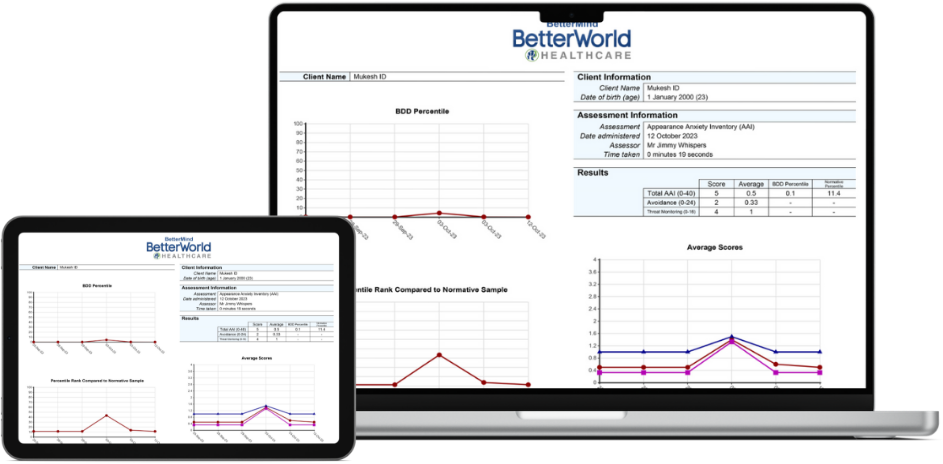Frost Multidimensional Perfectionism Scale (FMPS)
Assessments
Description
This inventory consists of 35 questions measuring four sub-scales of perfectionism:
- Concern over mistakes and doubts about actions
- Excessive concern with parents’ expectations and evaluation
- Excessively high personal standards
- Concern with “precision, order and organization”
Setting excessively high standards is the most prominent feature of perfectionism, accompanied by tendencies for overly critical evaluations of one’s own behavior, expressed in over concern for mistakes and uncertainty regarding actions and beliefs.
Some individuals take pride in their perfectionistic nature and such beliefs can be a key target for psychological intervention. This scale can be useful in highlighting that being highly perfectionist is in fact unhelpful. This test is appropriate for people 15 years and older and is especially appropriate for individuals with critical parents, anorexia, OCD traits or an anxiety disorder. Perfectionistic beliefs may be an important underlying cause of a range of psychopathologies.
Validity
The Frost Multidimensional Perfectionism Scale was created by Dr. Randy Frost and colleagues in 1990 and originally measured six sub-scales. Subsequent evaluation using principal components analysis found that four sub-scales were more appropriate. Stober (1998) validated the scale using 243 university student participants with an average age of 26.3 years. The validity of the scale has been widely established through convergence with other clinically significant problems, including anxiety in college students (Frost & Marten, 1990), insomnia (Lundh, Broman, Hetta, & Saboonchi, 1994), social phobia (Juster, Heimberg, Frost, Holt, Mattia, & Faccenda, 1996), obsessive-compulsive symptoms (Rheaume, Freeston, Dugas, Letarte, & Ladouceur, 1995) and anorexia nervosa (Bastiani, Rao, Weltzin, & Kaye, 1995). In fact, perfectionism may be the underlying trait in many of these problems.
Interpretation
Results consist of a Total Perfectionism score (total of subscales not including Organization) as well as four subscales, presented as raw scores and percentile ranks. The percentiles are based on the data from Stober’s (1998) sample of university students (mean age 26.3).Higher percentiles indicate more problems while a percentile closer to 50 represents the average response. High scores on the Organization subscale do not contribute to Total Perfectionism and are not intrinsically problematic, but combined with high scores on the other factors may exacerbate dysfunction.
The four subscales are:
- Concern over Mistakes and Doubts about Actions
(Questions 9,10,13,14, 17,18,21,23,25,28,32,33,34) - Parental Expectations and Criticism
(Questions 1,3,5,11,15,20,22,26,35) - Personal Standards
(Questions 4,6,12,16,19,24,30) - Organization
(Questions, 2,7,8,27,29,31)
Developer
Frost, R. O., & Marten, P. A. (1990). Perfectionism and evaluative threat. Cognitive Therapy and Research, 14, 559-572. Stober, J. (1998). The Frost Multidimensional Perfectionism Scale: More perfect with four (instead of six) dimensions. Personality and Individual Differences, 24(4), 481-491.
Try it and see how BetterMind can enhance your practice

Support
Frequently Asked Questions
You’ve got questions, we’ve got answers. Below you can find answers to some of the most frequently asked questions. If you can’t find the answer you’re looking for, please feel free to reach out to us at info@betterworldhealthcare.com.
I can’t open test results within the Web Browser
Assessment result PDFs are opened in a new tab within the web browser. If you click the results but they do not open, your browser will be blocking the popup. To resolve this, after you have pressed the test result, look out for an alert at the top of your browser notifying you that a pop-up has been blocked, then click "Allow".
I have forgotten my password. How can I reset it?
If you have forgotten your password please press “forgot password” within the app, or on the Web Browser App login page (https://app.bettermind-app.com/login). You will receive a new temporary password via email.
Can a Practitioner access BetterMind from their Smartphone?
No, A Client /Patient can answer assessment questions on a smartphone but the Practitioners/ Users can't administer BetterMind using a Smartphone. A computer, laptop or tablet will have to be used.


